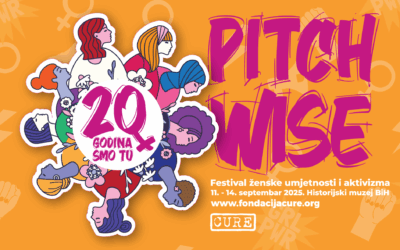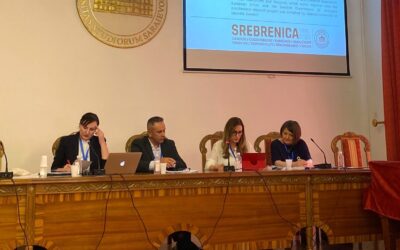Activist Vildana Džekman became involved in women’s human rights to challenge the hinders the Dayton agreement has led to for women’s equal participation in society. Photo from feminist art festival Pitchwise.
”It has been a huge barrier to the development of a democratic society!” 20 years after the Dayton peace agreement ended the war in Bosnia and Herzegovina, women human rights defender Lidija Živanovic’s judgement of its consequences is harsh.
After several years of brutal armed conflict, the Presidents of Bosnia and Herzegovina, Serbia and Croatia 14 December 1995 signed the Dayton Peace Accord. An agreement that also came to lay the ground for the constitution of the new Bosnia and Herzegovina.

”At first, we were full of hope. I had naïve thoughts that we would return to our normal lives and that we all, including women, would contribute to building our future,” says Lidija Živanovic, activist during the war and later leader of the human rights organisation Helsinki Citizens Assembly.
Focus on ethnicity
What went wrong, she says, was that the peace agreement, and therefore subsequently the constitution, totally lacked clear measures to make sure that Bosnia and Herzegovina would become a state that was gender equal. Instead it had all its focus on peoples’ origin – that Bosniaks, Bosnian-Croats and Bosnian-Serbs as groups would get their specific share of the power.
”The organisation and functions of the country were based exclusively on ethnicity. Since then, ethno-political elites have in words declared their support to build a more equal society, but through their daily politics they have been destroying key human values,” Lidija Živanovic says.
Discriminatory differences divide
The peace agreement divided the country into two entities – The Federation of Bosnia and Herzegovia and Republika Srpska, and since 2000 there is also the neutral Brčko District – ten cantons and a number of municipalities. All these levels have their own laws and regulations, making it incredibly difficult to get political national agreements on anything.
Gender study of DaytonIn 2000, Kvinna till Kvinna published a study of the Dayton agreement from a women’s rights and equality perspective. Already then its devastating effects were cleary visible.Find out more in the reportEngendering the Peace Process.
”The division is deepening every year. Women are ignored in Bosnia and Herzegovina, since the constitution does not recognize them as through the guarantee of women’s rights. Wherever you scratch on the surface you find segregation, discrimination and marginalization. For example, maternity benefits differs between cantons, and in some there are none at all! I ask myself is a woman in Tuzla worth less than a woman in Sarajevo? According to this structure she is,” says women human rights activists Vildana Džekman.
Censored history books
Vildana Džekman was 8 years old when the Dayton agreement came into place. Growing up in post-war Bosnia and Herzegovina she says she often wondered about things, like the black, censored pages in her history textbooks, or why there were hardly ever any women present when important political decisions were being negotiated. This eventually led her to the feminist organisation CURE Foundation, where she has been active for five years.
”It was actually during a seminar by Kvinna till Kvinna that I became aware of how invisible we women are. That the shadow of the constitution stretches throughout society, where women’s voices are not listened to and our actions are ignored, That gave me a strong motive to work for a changed constitution and women being an equal part of the process,”she says.
Both Vildana Džekman and Lidija Živanovic see drastical amendments of the constitution as the only way for Bosnia and Herzegovina to ever become a united, democratic and gender equal state.
Breading ground for nationalism
Kvinna till Kvinna’s Senior Advisor Eva Zillén, who was been active in our work in the Balkans since during the war, agrees:
”There was a lot of money and many international actors involved, but they mainly wanted building peace to go fast. So Dayton and therefore the constitution is full of shortcuts, that have made it impossible to form a unified country. Instead they have been a breeding ground for nationalism,” she says.
”There is a lot to be learned here, the sad part is that noone seems interested. Even though the ethnical division of power has been a failure in Bosnia and Herzegovina, the same model was used again by the US and its allies in Iraq and now it is talk of doing the same in Syria!”
Women’s movement successful
Still, Eva Zillén is somewhat hopeful.
”I know it is difficult to see when you live in the middle of it, but there has been some progress since the end of the war. Much due to the women’s movement which has managed to successfully push for laws on issues like gender equality and political quotas. However, the implementation of these laws is severly lacking. Which is something that the EU should address as a prerequisite to change if and when Bosnia and Herzegovina starts concrete negotiations to become a member.”
Malin Ekerstedt




